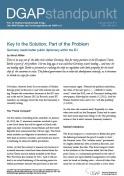Nowadays, whoever looks for assessments of Berlin’s Europe policy in Brussels is met with irritated eye rolling. Despite the ostentatious harmony at the EU summit at the end of January 2012 in Brussels, many EU members are unhappy about the tone that Germany is currently setting.
The “Fiscal Compact”
On the surface, everything looks amicable: on January 30, 2012, the 17 eurozone countries resolved to pass a new fiscal treaty that will be signed in March with eight non-euro countries (Great Britain and the Czech Republic have announced they will not sign). The fiscal treaty includes an obligation to introduce a national debt limit in all euro countries, and should also lead to a hardening of excessive deficit procedures.
Critics say that the contract is unnecessary because its essential measures could have been derived from the Lisbon Treaty and are already included in the Euro Plus Pact from the summer of 2011. And it will not lead to an actual hardening of the existing excessive deficit procedures because the provisions in the new treaty remain vague. “Beyond the political symbolism, the value of the new pact is (…) difficult to understand,” stated the FAZ, one of Germany’s leading daily newspapers, following the summit (1.2.2012). And the Wiener Standard even said it was “soft like pudding” (1.2.2012).
So why does this contract exist? Especially at a time when one could say the European Union and its members have more important things to do. The prevailing notion is that it exists because Germany wanted it.
Merkel’s Medicine
The fiscal compact is a concession to Berlin that gives the federal government the proof it needs to show the German voter: The “stability union” proclaimed by Angela Merkel has been asserted in Brussels, and Germany makes the rules. The fiscal compact stands in the tradition of the German belief that the European Union, as a community governed by the rule of law, cannot rest upon flexible arrangements, but rather must be based on binding rules – above all when Germany has to reach into its own pocket as it has done in the debt crisis. With regard to enforcing the rules, Germany has also floated the idea of a “savings commissioner” to watch over the implementation of reforms in Athens in the run-up to the Brussels summit. This sparked outrage in Athens and elsewhere, which has been met with astonishment in Berlin: Rules are ultimately there to be followed. The lack of intuition of German policy-makers on the response to such suggestions for those at the receiving end is baffling.
Saving and Growing?
There has not been enough critical reflection in Berlin over the fact that Germany’s attitude is perceived by EU countries as nothing less than “law-obsessed,” and fits well the cliché of a cold, German regulatory frenzy – a frenzy that does not respect the dignity of other EU countries (see FAZ from 29.1.2012: “Athen verlangt Respekt vor seiner Würde”).
Indeed, the focus in Berlin has in the meantime shifted to the question of how to promote growth while implementing necessary austerity measures in order to bolster the competitiveness of eurozone countries and to improve the difficult situation especially felt by the young population in Greece, Ireland, or Spain. In communicating the results of the European summit at the end of January 2012, the federal government thus placed the emphasis on European governments’ (admittedly small) impetus to increase growth.
In principle though, the predominant German analysis of the debt misery continues to be this: Lax eurozone countries knowingly broke the rules, and now Germany and other euro countries have to clean up their mess.
Schoolmaster Germany
While euro countries like Finland, the Netherlands, and Austria are secretly happy that Berlin has taken over the role of the “bad cop” and are hiding behind the broad back of Angela Merkel, her role has not been well received in all of Europe. Germany – with an attitude that is perceived as unyielding – is being seen more and more as a part of the problem. This holds not only for the question of which regulative model will in the end prove to be the successful way out of the crisis, and it is not just about the problem of Berlin now having to prove its leadership qualities – which is always brought up by critics (an echo of the 2010 and 2011 debates on German reticence).
The problem is far deeper: The ghosts of the past are back on Brussels’ negotiating tables. Germany is perceived as dominant, arrogant, and uncompromising. Rules were broken, so now the rules and supervision are being intensified. Black or white. White or black. But other EU countries see a lot more nuance. They point to the advantages that Germany draws from the euro and the euro crisis, as well as the German “fall from grace,” and the violation of the Stability and Growth Pact in 2003 (“Did Germany sow the seeds of the eurozone debt crisis?” asked the BBC in an illustrative broadcast that looked back upon Germany’s breaking of the deficit rules).
Better Public Diplomacy is Needed
In the face of this perception, the federal government has to demonstrate that it is more receptive. Especially now, when the viewpoint in Berlin is that the debt crisis, which has become a political crisis of the European Union, needs an all-out solution, and that indeed it is solvable. Especially now, when the federal government has shown that is ready to take over leadership. It would be fatal if Berlin were to carelessly shrink its scope for action.
But this is exactly what would happen if Germany’s policy in Europe continued to be imperceptive of the woes of its partners in countries that are now facing difficulty. The Federal Republic will continue to be confronted with growing anti-German rhetoric. Rules and procedures are only one part of the problem. Berlin must finally develop a convincing public diplomacy toward the EU countries and citizens most affected by the crisis. And it must have a better feel for the fact that statements directed at a German voting constituency will eventually find their way to Athens, Lisbon, or Dublin.
In addition, the federal government should better explain its conduct in Brussels and other EU capitals. Beyond governments and EU institutions, it should more purposefully approach opinion leaders in the media and think tanks, and not only during EU summits. The impression that Germany has no interest in a controversial debate and only wants to get its way behind the closed doors of the European Council must not be reinforced.
Above all, it is important to increase visibility in affected partner countries and to show more understanding for the difficult situation faced not only by the population but also government officials and members of parliaments. Although German embassies are aware of the necessity of public diplomacy in the course of the debt crisis, this duty requires a much stronger visibility, for instance through visits by top-ranking German politicians.
Why don’t representatives of the federal government, parliament, or even the Chancellor herself travel more often to the countries that are suffering from the crisis? Where are the visible gestures of support for the difficult reform processes, which more than symbolic gestures could offer concrete help? Surely the federal government is already doing something without shouting it from the rooftops. But they should better inform the European public of it.
On the other hand, Germany’s partners must make themselves aware that even today Germany is by no means the natural leader in the European Union. The past few months have shown that Berlin is still having a hard time with this role and must get used to it. EU countries that share Germany’s attitude but until now have been hiding behind Berlin should demonstrate this much more firmly – as did the Finnish European Minister Alexander Stubb in the run-up to the European summit at the end of January 2012. For it is doubtful that Berlin will react to growing pressure in the way that critics would like it to – namely with more motivation.
The opening salvo given by Christine Lagarde a few weeks ago in the DGAP before the global economic elite met in Davos to blow the same horn – equipped moreover with World Bank President Robert Zoellick’s “blueprint” in the Financial Times on how Germany should save the euro – could also backfire. Right now, no one in Europe is interested in retreating into the type of shell that a reticent-acting Germany went into at the beginning of the Greek debt crisis in 2010.

